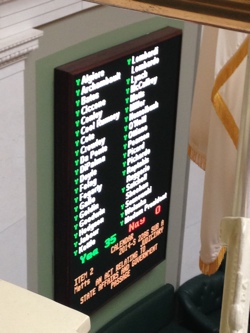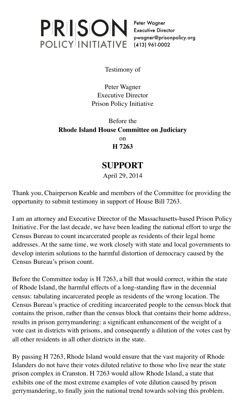Rhode Island Senate passes bill to end prison gerrymandering by counting incarcerated people at home for redistricting purposes.
by Aleks Kajstura,
May 14, 2014
Last night the Rhode Island State Senate passed S 2286A, a bill to end prison gerrymandering in Rhode Island. The bill passed unanimously with bipartisan support.

The bill would count incarcerated people at their home addresses for redistricting purposes. The last time the state redistricted, it used population data from the Census Bureau, which tabulated incarcerated people as if they were residents of the correctional facilities. That choice continues to inflate the votes of Rhode Island residents who reside in districts that contain the state’s prison complex, Adult Correctional Institutions (ACI). But voting equality won out last night when the Senators representing the districts that contain the ACI were among those to cast their votes in support of the bill.
Unfortunately the bill has an uphill battle coming up in the House, where the House Speaker, Representative Mattiello, is apparently opposed to electoral equality. The Providence Journal reported that Mattiello indicated that the bill “will not get a vote in the House.”
Mattiello’s comment was a dramatic reversal on his part given that in 2010 he supported counting people at their actual residence, saying: “I’d be happy to have more people who can actually vote for me.” (Folks incarcerated at the ACI can’t vote for Mattiello. They are either disenfranchised or must vote by absentee ballot for a representative in their home district.)
Stay tuned for updates as the bill heads to the House Judiciary Committee next.
by Peter Wagner,
May 2, 2014
Last night, the Rhode Island Senate Committee on the Judiciary unanimously passed S2286, “The Residence of Those in Government Custody Act,” sponsored by Senators Metts, Crowley, Pichardo, and Jabour. The bill now moves on to the floor. Earlier this week, the House committee held a hearing on the bill. To stay up to date on the bill, see our Rhode Island campaign page.
The political clout of all but 112 Rhode Islanders is diminished by prison gerrymandering.
by Peter Wagner and Leah Sakala,
May 1, 2014
 Here at PPI we talk a lot about how nearly everyone benefits when state and local governments take action to end prison gerrymandering. That’s because prison gerrymandering gives a political boost to only the handful people who happen to live right near a state’s biggest prison, and dilutes everyone else’s votes.
Here at PPI we talk a lot about how nearly everyone benefits when state and local governments take action to end prison gerrymandering. That’s because prison gerrymandering gives a political boost to only the handful people who happen to live right near a state’s biggest prison, and dilutes everyone else’s votes.
This week when we were writing testimony in support of Rhode Island’s pending bill to count incarcerated people at home for redistricting purposes, we set out to document the extent of prison gerrymandering’s impact in that state.
The results were grim: When we tallied up all the people who suffer from prison gerrymandering on the state level with senate and house elections, and on the local level in municipal elections, we found that only 112 Rhode Islanders — 0.011% of the state — are left unscathed.
In our opinion, that’s reason enough for the Rhode Island legislature to move forward with putting an end to prison gerrymandering. But there are lots of other good reasons dictated by both Rhode Island law and common sense:
- Rhode Island law clearly says that incarcerated people aren’t “residents” of the cells they’re confined in (Rhode Island General Laws § 17-1-3.1.).
- The incarcerated people who retain the right to vote aren’t even allowed to vote in the jurisdiction they’re incarcerated in. Their only option is to vote absentee in their home communities.
- Incarcerated people can’t meaningfully participate in the community that they’re confined in, and in Rhode Island they don’t even stay very long. The median wait for people who are detained pre-trial is three days, and the average sentence doled out to those who have been convicted of a crime is under two years.
- Rhode Island’s prison gerrymandering problem is particularly severe because everyone who’s incarcerated in the state is shipped to one place: the Adult Correctional Institute in the City of Cranston.
H 7263, “The Residence of Those in Government Custody Act,” would protect ALL Rhode Island residents by ensuring that 100% of the votes cast in the state are free from the pernicious influence of prison gerrymandering.





